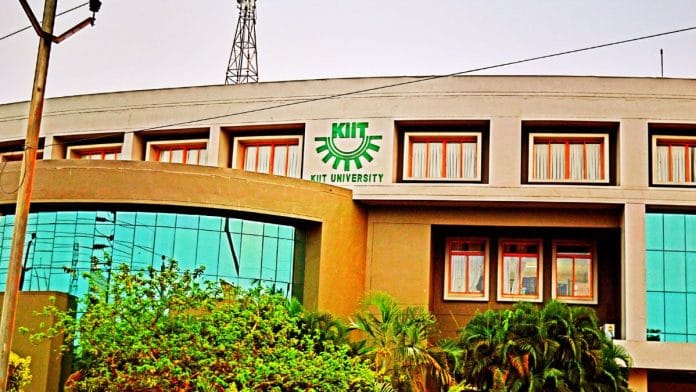New Delhi: The suspected suicide of a student from Nepal at the Kalinga Institute of Industrial Technology (KIIT) in Bhubaneswar Sunday due to alleged harassment from a batchmate has led to a diplomatic incident between New Delhi and Kathmandu.
On 16 February, a 20-year-old engineering student from Nepal was found dead in their hostel room. Police officials have pointed out that the first impressions from the investigation indicate that the student died by suicide.
The death triggered peaceful protests Sunday by students from Nepal, with roads near the KIIT campus being blocked, according to media reports. The protesting students alleged that the student reached out to the International Relations Office at the university, flagging harassment by a batchmate; however, no action was taken.
Videos surfacing on social media show KIIT staff members allegedly asking the Nepali students to vacate the hostels immediately while behaving in an unruly manner. In one video, a KIIT authority is seen defending the founder of the institute, stating that they are feeding “40,000 students for free”, which is more than “the budget” of Nepal. Authorities also asked the students to pack their belongings and “just leave”. ThePrint has not independently verified the veracity of the videos.
A batchmate has been detained in connection with the incident. The university, in a statement, pointed to an alleged personal dispute between the two, which led to the death of the student from Nepal.
The Prime Minister of Nepal, K.P. Sharma Oli, has commented on the incident, stating that the government has made arrangements to ensure that the students can remain on campus or return home based on their preference.
Our Embassy in New Delhi has dispatched two officers to counsel Nepali students affected in Odisha.
Additionally, arrangements have been made to ensure they have the option to either remain in their hostel or return home, based on their preference. #Nepal #Odisha
— K P Sharma Oli (@kpsharmaoli) February 17, 2025
The Embassy of Nepal in New Delhi has also dispatched two officers to counsel Nepali students in Odisha. KIIT has also rescinded its earlier order requiring over 500 Nepali students to leave campus and head home, following outreach by the Embassy of Nepal.
In a statement, KIIT said, “There was an unfortunate incident which took place late in the evening yesterday on the KIIT campus. Immediately after the incident, police investigated the matter and apprehended the culprit. The KIIT administration has taken all-out efforts to restore normalcy on the campus and in hostels to resume the academic activities. An appeal is made to all our Nepali students who have or plan to leave the campus to return and resume the classes.”
Earlier Monday, the institute had announced “sine die” for students from Nepal and, according to media reports, asked them to board buses, dropping them at various railway stations and instructing them to head home.
“The embassy discussed with the Registrar and other representatives of KIIT… The said educational institution has informed the Embassy that it will make arrangements for students to stay in the dormitory and organise classes for Nepali students,” said the Embassy of Nepal in a statement on the social media platform X.
The statement added: “The educational institution has expressed its commitment to take the matter seriously and will insist on an independent and impartial investigation into the death” of the Nepali student.
The Embassy of Nepal in New Delhi has been in touch with the Ministry of External Affairs as well as the government of Odisha.
The order by KIIT to send the Nepali students back home has been criticised by different student organisations. The Akhil Bharatiya Vidyarthi Parishad (ABVP), affiliated with the Rashtriya Swayamsevak Sangh (RSS), condemned the “suppression” of protesting Nepali students by the KIIT administration.
“Asking Nepali students to vacate the campus is illegal & an attack on Bharat-Nepal relations. We demand a fair investigation & action against those responsible. The administration must ensure justice, not silence voices seeking the truth!” said the ABVP in a statement on X.
(Edited by Radifah Kabir)
Also Read: Nepal blocking China’s Panchen Lama visit is rare resistance. It’s not enough







It’s good to see Nepali students studying for an engineering degree. In our state, they are only interested in a career with the armed forces. And Plan B is to work as security guards and watchmen. Often people derogatorily refer to them as “Shaab-ji”.